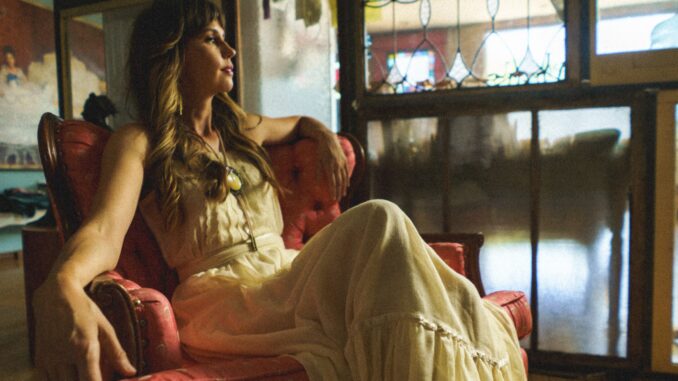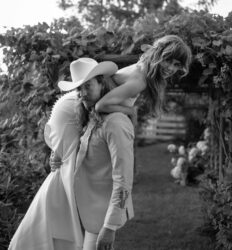
It was a windy, wintry January day in Chicago when June, Michelle Billingsley’s 50-pound Australian Shepherd, jumped up beside her on the couch. “Yeah, she saw me putting on my makeup, which usually means I’m going out,” she explained. “But it’s alright; she can sit in while we talk.”
Billingsley grew up in Michigan and after college went out to Los Angeles for a year and a half and hated most every minute. So, she sold all her belongings and moved back home to Grand Rapids, which ultimately was simply too small of a town. She looked at a map and put a pin in the closest large city, which was Chicago. The story is as old as the silver screen. Pretty young girl leaves small midwestern town and heads for Hollywood with stars in her eyes. Just like thousands of other girls. She worked auto shows, made industrial commercials, was an extra when big budget movies were being filmed, but nothing of substance came her way. She got tired of waiting for the phone to ring.
In Chicago, she was taking voice lessons and her teacher was in a cabaret group. “I did some cabaret shows,” she recalled, “but I couldn’t stop thinking what to do with my hands while I’m singing? There is only so much you can do. I saw a sign at a bus stop that said come learn guitar at the Old Town School of Folk Music. I studied there for a few years and learned all about folk and country, bluegrass and old-time music. That led to open mics, but I was doing covers and that was hard always moving the key around the neck. Too much to figure out. Math and my brain are bitter enemies. So I thought, what if I wrote songs for myself? Sounded easy.”
To support herself, she took a boring day job, but she did get to work from home, which was much better than sitting in a cubicle all day. I asked her if she ever did her work like that clueless government employee, who didn’t return to the office after Covid and videoed himself sitting in a bubble bath, ostensibly working. “I didn’t have anything to put my computer on,” she teased. “I’d have been worried my fingers would get wet and drip all over the keyboard. But I could have, especially with all these filters on cameras, you can just blur your background, cut your face out, and you can be anywhere else. Just wear a Dickie on top so it looks like you’re wearing a shirt.”
She had to fill out a form for her work review, and one question was, what are your life goals? She left it blank because her goals had nothing to do with the job; she was just there to fund her project. “I began writing songs and joined an all- female folk trio called 11 Dollar Supper. We thought $3 was too cheap for a meal and $22 too high class. We wanted to be in between like in a restaurant you might see driving down Route 66. We were short-lived; Amanda left and Samantha had a baby. I ended up in the Chicago music community two-stepping, and I was like, this is way more fun than boring folk music. So, I started writing country songs.”
She learned to play a softer, fingerstyle guitar when doing folk music, but country and bluegrass are usually louder and at a faster tempo. In videos you can see her strumming so hard it looks like she’s rubbing clothes on an old washboard. For a holiday show last year, she went back to fingerstyle. It afforded her the chance to play one of her favorite songs from Christmases past with her family. “We had an Ed Ames vinyl LP, and there was a song called ‘The Miracle of the Christmas Donkey.’ It’s this little song about how a donkey named Dominic thinks he’s so ugly and not good for anything. All the other animals have a job and he doesn’t. And then the chorus goes, what if you carry Mary? Then he was very proud and he’s like, I feel beautiful. I’ve never met anyone else who knows the song.”
In middle school Billingsley wanted to be a veterinarian, so she took all the science classes until she got to organic chemistry. “I was like, well, that’s horrible.” She saw that the local theater was doing improv classes and that sounded like fun. She got the timing down and joined an improv troop in Grand Rapids, auditioned for the “Second City” touring company in Detroit and got on the wait list, which provided the opportunity to train with the program. “The problem with improv,” she said, trying to decide how to put it, “is the other people who do it are crazy and, well … I don’t like hanging out with them. It’s just these people never turn off, and they’re always trying to one up each other’s jokes. I don’t want to play that game.”
She and her partner, Wild Earp, began teaching two-step lessons around town, promising those who took the class that they could learn to do the steps in an hour. “They start coming out to shows and then you get to dance with them once they’re out. It’s so much fun.”
The main thing with dancing is people need to learn to feel their feet. So, if someone like me asked her to explain feeling your feet, what would she say? “We say we start on your left foot with a quick step, so it’s quick, slow, slow, slow, quick, quick, slow, slow, left, right, left. You only have two feet. It’s so easy. Also, if people are having trouble with that, I think of it as kind of like a three. So 1, 2, 3, 4, and quick, quick, slow ….” Holding up the stop sign, I said: “Okay, enough of that, Michelle. In my mind, I’ve crushed your toes. Remember what you said about no math.” There was no stopping her when on the subject of two-stepping. “It’s because two-step is a three count over a four count. So, you’re a beat off. That’s how you get that motion and …. Okay. I’ll teach you in person if you want.”
Her songs can be very blunt, almost in your face. Love songs need not apply. It took a while before she wrote her first one. “I’m not interested in the big primary colors of country music topics,” she said firmly. “I just sit around and live life until something interests me and then I write a song about it. But a lot of the honky-tonkers are not listening to the words, so they’re just enjoying a nice sounding fun song and I’m up here writing songs for the people who just like to dance with lyrics for people who like lyrics because I’m a lyrics person. Sometimes, people are like, wait a minute, this song is kind of devastating, but everyone’s dancing to it.”
Sometimes on live shows, she is part of Wild Earp & The Free-For-Alls, but she fronts her main band. “Earp and I have also been touring internationally,” she said, adding it’s cheaper to buy two plane tickets. “We do classic country duets: Johnny and June, George and Melba.” Not George and Tammy? “Have you heard the podcast “Cocaine and Rhinestones?” Well, they weren’t friends. I kind of like the Melba Montgomery stuff better.”

Billingsley’s songs are not always written from the male perspective, something she thinks dominates country music. ‘Gaslighting’ is a good example with its dose of irony. Her best friend was the inspiration for that song and also ‘She Married a Man.’ “It turned out the husband had a little personality disorder, some narcissistic tendencies,” she hinted. “She was realizing how much he was gaslighting her, and I thought, that sounds like such a fun word. I was like, how can I make this fun? How can I take a different route with the words? Then the whole idea of the song just spilled out quickly.”
Off her self-titled debut, ‘When Will You Learn?” is a song that draws you in from the first verse. The way she said “Chicago” made it sound like a swear / Your ears got hot across the bar, finally God was fair / This one was the one to help you burn away your past / Now she’s purring like a kitten, but there’s silence in your pants / When will you learn?
“That song came about from a mondegreen,” she said with a sly wink. “I was listening to a Kris Kristofferson song and I thought I heard, she was younger than alright. I was like, oh God, you write the best lines. Then I googled it to make sure I heard it right and found out he never wrote that song. Perfect. That line is mine now.”
The closing song is ‘Then I Remember,’ a poignant tale of a woman finding out her man is no longer with her. She’s sitting in an easy chair waiting for him to come home, finding the bed covers still pulled up, etc. “My friend Cheryl’s brother died unexpectedly of a heart attack. She was slowly picking up the pieces and would say the worst part was seeing something on Facebook and go to send it to him. Then I remember that he’s not here anymore. That struck me, oh, there’s something there. I made sure to set the song in the fifties, with the lipstick and the dress you made me buy on a honeymoon. I don’t say called your number; it’s dialed your number. Sometimes I write songs like that by setting the scene in my head, and then I can move the characters around.”
Before the interview began, Billingsley had been doing vocal exercises to combat a neurological condition that affects her voice. The signal from her brain to the vocal cords is somehow degraded. You might call it a mixed message. She thinks of it as the signal is being hacked. “I kick all the guys out of the van when I have to do my very annoying vocal exercises that no one else is allowed to hear. They’re just awful.”
Her voice teacher suggested she go to see a nose and throat specialist to find out if the condition was physical. As opposed to what? She agreed to go but believed they wouldn’t find anything wrong. “They stick a camera down your nose to look at your vocal cords, and the doctor said I have a spasmodic dysphonia. He pointed me down to the end of the hall where there was a computer and said watch that video and call back if you have any questions. That felt really dismissive.”
This happened to her at a very inconvenient time – not that there are convenient times. Her second album had just been released, and she was preparing to go out on tour supporting it. In retrospect, she wished the album had been held up, but regrets are out in the kitchen making coffee. Life goes on and you deal with it.
“I thought, well, it’s not so bad – that was 2021. We got the right muscles working, but I would still notice it. I was on a two-week tour in Texas, and, oh man, how will I survive two weeks? I went back to the vocal therapist, and she told me it’s worse. So, I have an appointment for an injection of Botox in my larynx. Hopefully that would paralyze the muscles that had pushed the vocal cords together, and hopefully a few rounds of this and maybe my brain might grow new neural pathways and signal to the muscles to go around it. But right now, my voice is really fragile and hard to sustain.”

Matt Brown produced the first album, but Billingsley went DIY on “Both Sides of Lonely.” She felt that had she learned enough from Brown, combined with the reality that she’s not good about listening to other people’s opinions. “Earp was there to bounce things off,” she said, referring to ideas not dinner plates and cutlery. “I’ll bring home mixes for him and he will say, oh, I wouldn’t do it that way, being his own producer and all. I was like, how dare you say that? That is the only way I ever want to do that. But he’s the same way. I would say to him, hey, it would be cool if you did that. And he would say, absolutely not. We’re working on communication, but we both get it.”
For the latest album, she wrote all the songs except for a cover of the old chestnut, ‘Bad Case of the Blues.’ “My friend Caitlyn is a DJ,” she explained, “and she would spin her husband’s vinyls, obsessed with Linda Martell’s “Color Me Country” album. I liked how it has a classic country feel. Besides, there was a little chance for some yodeling. It was made famous by a badass chick, and I just want to continue that legacy.”
‘Champagne Toast’ has that old love triangle thing going on. Apparently, Billingsley can pop the cork on a love song. She and him and me and three’s company. “If you’re raised as a people pleaser, it’s hard to say no. The song is about that first time and you should have said no instead of, well, I’ll try it for you. Turns into never again being given a chance to say no.” In ‘I Love the Way He Says He’s Sorry’ she slides her tongue over towards her cheek. “It was pretty sassy. I think I came up with that title first and thought, how can I turn this around? That’s another song where it’s upbeat and danceable, and until you listen to the lyrics, you have no idea what’s going on. I guess I just like arguments.”
As a songwriter, Billingsley has developed a reputation for being unguarded, whether with a wink and a smile or a soft, disarming sincerity, often tackling subjects considered taboo for polite women in country music. On “Both Sides of Lonely,” she sings her heart out about everything from depression, isolation and self-sabotage to casual sex and nuclear winter – though you might not catch it all on first listen, as she likes to veil her most cutting lyrics in raucous strumming, her dry, dark sense of humor and a whipsmart-assed vocal delivery.
“It was very different this time in that it was straight from the faucet,” Billingsley said. “I didn’t have to go through someone else’s expectations of what my music should sound like. Though I do hate having to make all the decisions. You wonder, am I doing this all wrong? You have to learn to trust your gut reaction and say no, that’s not what the song is supposed to be. And sometimes you have to listen again, or sleep on it and see if your opinion changes. The whole time you’re walking a tightrope above pitfalls, and if you’re not careful you can go straight through the floor.”
There was a flow from folkish to honky-tonk on the first two albums, and you wonder what the third will sound like. She has finished one song called ‘Broke Like a Colt’ where the character has had a string of losses and is broke. It’s an interesting concept where she uses the word “broke” in other ways like broke a promise. “On the first one, I was aiming for this Tammy Wynette meets Margo Price thing with the sounds of late sixties instruments and preamps. This new song is just a little bit further down the road, closer to late seventies or early eighties tastes. There’s more Conway Twitty, more fur rugs in front of the fireplace.”

When can we expect to hear this new album? Will her voice hold up enough to even record it, never mind tour? Doe she ever talk about or call Earp by his given name, even if it wasn’t given? It’s a step into the unknown, which isn’t necessarily a bad thing.
“That’s a good question, or questions,” she said, pausing to ponder answers. “Earp (not Wild) spent a decade recording a double-album that was just mastered last month. We try not to release things the same year, so I need to wait for him to figure out when he’s going to release it. For mine, it’s all depending on this injection to make my voice stronger. Maybe late 2025?”
She did a radio interview in Chicago, and the interviewer asked if she often gets distracted when playing a song. She answered that the lyrics get her into the point of view of the character, and sometimes that is distracting, to be looking out from the eyes of that character to see what else is going on around the room. “Going back into the character’s POV, I forget the next word because I forgot I was playing live. In stage training, I really resonated with mask work. How when you put a mask on, that mask comes alive and it’s not you, it’s the mask.” The way she describes it sounds similar to the effect it had on the actor Jim Carrey in the movie, “The Mask.” Without the superpowers. “I like slipping into the mask of that character,” she continued, “just to get me in the mood for that song but don’t forget to keep playing.”
It’s apparent Billingsley has quite the imagination. When asked what her idea of a perfect day would be, she poured back an answer like drenching a stack of pancakes with maple syrup. “I dream about this,” she said, obviously excited. “So, I would wake up and have time to meditate or do something calming, and then I would do some chain stitching. I could do some administrative booking work, and then I could write songs. I would have a little recording studio where I can just walk in and put some ideas down. Drink wine at night. And then off to bed.”
“I Love the Way He Says He’s Sorry,” about picking fights with a significant other just because he’s so damn good at apologizing. The song explores a woman firmly in command of her relationship, operating confidently on her own terms. Musically, though, it offers a welcome contrast, two-stepping in heels across the slick hardwood floors of a country dancehall with a shambling, ramshackle grace that teeters on the brink of collapsing into a two-left-footed tumble. But somehow she holds it together long enough steal the spotlight and everyone’s hearts. It’s not a stretch to say that is a description of Michelle Billingsley.


